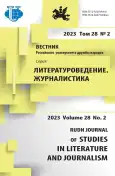Transforming the future: a review of artificial intelligence models
- Authors: Pugachev A.A.1, Kharchenko A.V.1, Sleptsov N.A.1
-
Affiliations:
- RUDN University
- Issue: Vol 28, No 2 (2023)
- Pages: 355-367
- Section: JOURNALISM
- URL: https://journal-vniispk.ru/2312-9220/article/view/318910
- DOI: https://doi.org/10.22363/2312-9220-2023-28-2-355-367
- EDN: https://elibrary.ru/RZMQIG
- ID: 318910
Cite item
Full Text
Abstract
A comprehensive review of existing artificial intelligence models, focusing on fourteen prominent language and multimodal generative models from four rapidly evolving categories: Marketing, Copywriting, Image Improvement, and Social Media, is made. As of May 2023, 1,523 AI models are available to end users, with notable Russian services such as Balaboba, GigaChat, and Kandinskiy 2.0 emerging as counterparts to popular foreign neural networks. The potential applications of these tools in various media production domains, including journalism, marketing, and copywriting, are explored. It was necessary to talk about language models, since these are the ones, most connected not only to the media sphere, but to academic writing as well. Moreover, the authors delve into the ethical considerations associated with the use of AI models in professional settings, addressing potential challenges and concerns. The importance of responsible development, use, and regulation of AI technology, as well as the need for collaboration among researchers, governments, and private organizations to ensure ethical AI practices, is highlighted. The authors also outline the prospects for further development of AI models and related research, emphasizing the need to foster an environment of continuous learning for innovation that is inclusive and accessible. This approach will help maximize the benefits of AI while minimizing potential harm, paving the way for a more prosperous, equitable, and sustainable future. The presented materials can serve as an introduction to the emerging branch of AI models development.
About the authors
Andrei A. Pugachev
RUDN University
Author for correspondence.
Email: quadriptych@gmail.com
ORCID iD: 0000-0001-6722-2431
PhD student, Department of Mass Communication, Faculty of Philology
6 Miklukho-Maklaya St, Moscow, 117198, Russian FederationAlina V. Kharchenko
RUDN University
Email: kharchenko-av@rudn.ru
ORCID iD: 0009-0001-8105-892X
lecturer, Department of Mass Communication, Faculty of Philology
6 Miklukho-Maklaya St, Moscow, 117198, Russian FederationNikolai A. Sleptsov
RUDN University
Email: nikolai.slepcov@skillbox.ru
ORCID iD: 0000-0002-3447-8008
lecturer, Department of Mass Communication, Faculty of Philology
6 Miklukho-Maklaya St, Moscow, 117198, Russian FederationReferences
- Benefo, E.O., Tingler, A., White, M., Cover, J., Torres, L., Broussard, C., Shirmohammadi, A., Pradhan, A.K., & Patra, D. (2022). Ethical, legal, social, and economic (ELSE) implications of artificial intelligence at a global level: A scientometrics approach. AI Ethics, 2, 667-682. https://doi.org/10.1007/s43681-021-00124-6
- Boddington, P. (2017). Towards a code of ethics for artificial intelligence. Cham: Springer. https://doi.org/10.1007/978-3-319-60648-4
- Bostrom, N., & Yudkowsky, E. (2014). The ethics of artificial intelligence. In K. Frankish & W. Ramsey (Eds.), The Cambridge Handbook of Artificial Intelligence (pp. 316 -334). Cambridge: Cambridge University Press. https://doi.org/:10.1017/CBO9781139046855.020
- Brown, T., Mann, B., Ryder, N., Subbiah, M., Kaplan, J.D., Dhariwal, P., Neelakantan, A., Shyam, P., Sastry, G., Askell, A., & Agarwal, S. (2020). Language models are few-shot learners. Advances in Neural Information Processing Systems, 33, 1877-1901. https://doi.org/10.48550/arXiv.2005.14165
- Coeckelbergh, M. (2021). Time machines: Artificial intelligence, process, and narrative. Philosophy & Technology, 34(4), 1623-1638. https://doi.org/10.1007/s13347-021-00479-y
- Córdova, P.R., & Vicari, R.M. (2023, January). Practical ethical issues for artificial intelligence in education. Technology and Innovation in Learning, Teaching and Education: Third International Conference, TECH-EDU 2022, Lisbon, Portugal, August 31 - September 2, 2022, Revised Selected Papers (pp. 437-445). Cham: Springer Nature Switzerland. https://doi.org/10.1007/978-3-031-22918-3_34
- Dignum, V. (2018). Ethics in artificial intelligence: Introduction to the special issue. Ethics and Information Technology, 20(1), 1-3. https://doi.org/10.1007/s10676-018-9450-z
- Hartmann, K., & Giles, K. (2020). The next generation of cyber-enabled information warfare. 2020 12th International Conference on Cyber Conflict (CyCon), Estonia, 2020, 233-250. https://doi.org/10.23919/CyCon49761.2020.9131716
- Heaven, W.D. (2022). Language models like GPT-3 could herald a new type of search engine. K. Martin (Ed.), Ethics of Data and Analytics (pp. 57-59). Auerbach Publications. https://doi.org/10.1201/9781003278290
- Lukina, M.M., Zamkov, A.V., Krasheninnikova, M.A., & Kulchitskaya, D.Y. (2022). Artificial intelligence in the Russian media and journalism: the issue of ethics. Theoretical and Practical Issues of Journalism, 11(4), 680-694. (In Russ.) https://doi.org/10.17150/2308-6203.2022.11(4).680-694
- Lund, B.D., Wang, T., Mannuru, N.R., Nie, B., Shimray, S., & Wang, Z. (2023). ChatGPT and a new academic reality: artificial intelligence-written research papers and the ethics of the large language models in scholarly publishing. Journal of the Association for Information Science and Technology, 74(5), 570-581. https://doi.org/10.1002/asi.24750
- Luzi, L., Siahkoohi, A., Mayer, P.M., Casco-Rodriguez, J., & Baraniuk, R. (2022). Boomerang: Local sampling on image manifolds using diffusion models. https://doi.org/10.48550/arXiv.2210.12100
- McKay, F., Williams, B.J., Prestwich, G., Bansal, D., Hallowell, N., & Treanor, D. (2022). The ethical challenges of artificial intelligence-driven digital pathology. The Journal of Pathology: Clinical Research, 8(3), 209-216. https://doi.org/10.1002/cjp2.263
- Paek, S., & Kim, N. (2021). Analysis of worldwide research trends on the impact of artificial intelligence in education. Sustainability, 13(14), 7941. https://doi.org/10.3390/su13147941
- Thorne, S. (2020). Hey Siri, tell me a story: Digital storytelling and AI authorship. Convergence, 26(4), 808-823. https://doi.org/10.1177/13548565209138
- Zhou, K.Q., & Nabus, H. (2023). The ethical implications of DALL-E: Opportunities and challenges. Mesopotamian Journal of Computer Science, 2023, 17-23. https://doi.org/10.58496/MJCSC/2023/003
- Zhu, P., Pang, C., Wang, S., Chai, Y., Sun, Y., Tian, H., & Wu, H. (2023). ERNIE-music: Text-to-waveform music generation with diffusion models. https://doi.org/10.48550/arXiv.2302.04456
Supplementary files









